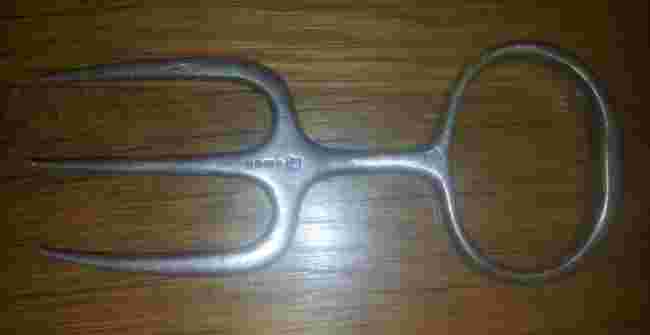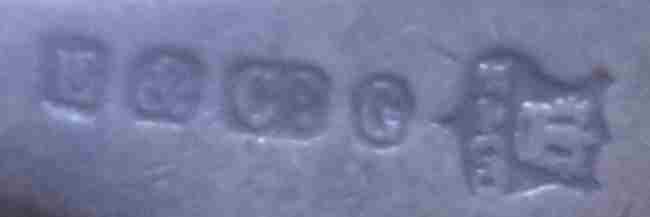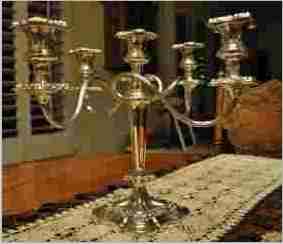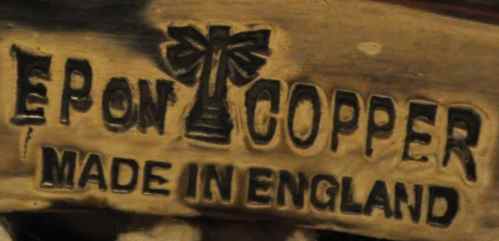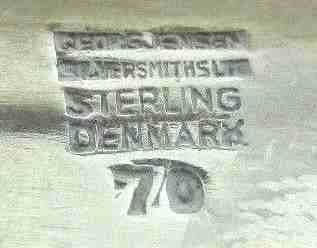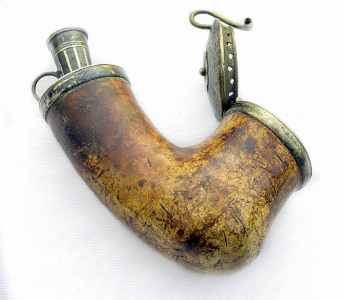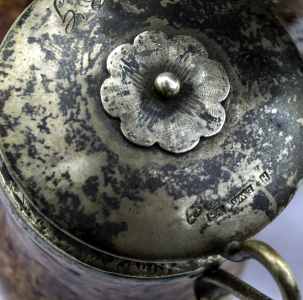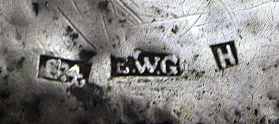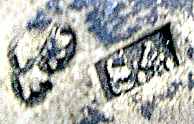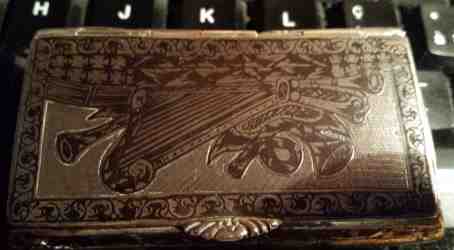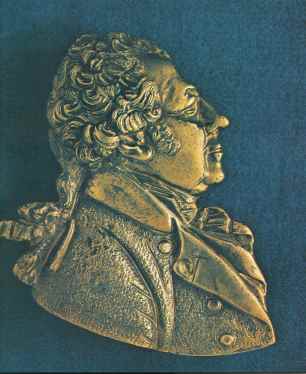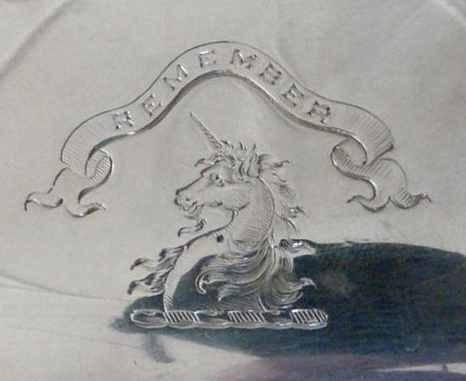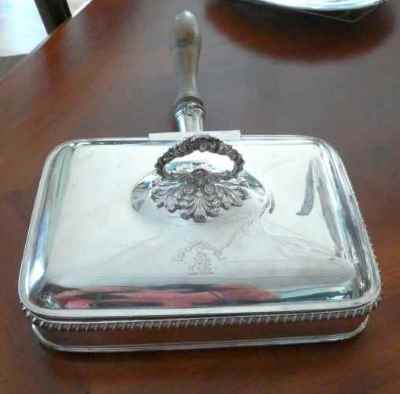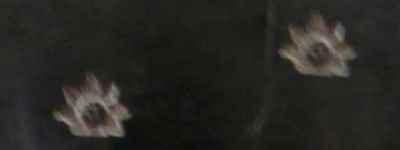2015 ASCAS membership
LAST WARNING
Members still interested in ASCAS and its activity are
invited to send an e-mail to:
Confirming your 2015 membership please compile a new mail
and don't use the "reply" button on this mail.
No action is requested to unsubscribe. Members not confirming
their membership will be automatically deleted and shipping of
our monthly Newsletter will be suspended on February
2015.
Giorgio Busetto
ASCAS Secretary
PLEASE IGNORE THIS
ANNOUNCEMENT IF YOU HAVE ALREADY CONFIRMED YOUR INTEREST, BY
EMAIL, WITHIN THE LAST DECEMBER.
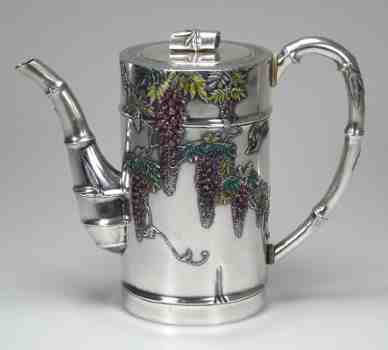
Jeffrey Herman was just elected into the prestigious Fellow
category of the Institute of Professional Goldsmiths in England.
He's the only Fellow living outside England. Herman was
nominated by three other Fellows of the IPG that felt him worthy
of this honor.
In this newsletter Jeffrey Herman presents:
The Beauty of Pulse Arc Welding

This Meiji-era teapot needed its handle secured and its dents
removed from the single-walled body, double-walled cover, and
removable tea strainer that sits under the cover.
There had been a rod extending through both ivory insulators.
One end was hard soldered to the handle and the other was peened
over on the inside of the pot. Over time, this assembly loosened.
I removed both rods then welded new ones to the body, covering
the holes.
I then drilled holes through the handle for the rods to extend
and countersunk the holes.
After I reinstalled the insulators over the rods, I attached the
handle with the rods protruding through the holes.
I then pulsed down over the rods, spreading the silver into the
countersinks and securing all parts for an undetectable repair...
click
here

Welcome to new ASCAS members:
Richard Friestad - USA
Carol Hopkins - Australia
Carole Johnston - England UK
Philip Poniz - USA
Sheldon Blom writes:
...My brother's friend was working in the garden at home, and
came across this. He since gave it to me, and I've been asking
around, and no one seems to have any idea what this is, or used
for? A garden fork, a bread fork, a serving fork even?
I did some browsing online and came across your site.. Well it's
great and very helpful! So I thought I'd send some pictures of
what the item looks like, as well as the zoomed in photo showing
the hallmarks.
The hallmarks read, "E & Co" with the letter " C" or "G" (But
looks like a "G" to me) and an emblem with a "Crown with E&CO"
Sheldon
It's a silverplate meat fork made by Elkington & Co, year
1892. see my website at
http://www.silvercollection.it/Elkington.html
Giorgio Busetto
Chris & Sue Driver write:
...Please can you give me a clue as to what the marks mean on
the spoons shown in the attached photograph?
Chris & Sue Driver
Michael B. Neville writes:
...I am trying to identify the maker of a silver electroplated
candelabra but I could not find the markings on your site.
I have attached a photograph of the candelabra as well as a
close up of the markings found on the side of the base.
I would appreciate it if you could help me to identify the maker
as well as provide any additional information you may have
regarding the possible age of the piece.
Michael B. Neville
Charles C. Cage writes
I believe the Rev. Dr. Long is mis-reading the marks on his
Swedish pipe.
The "H" is not the date letter, but the city mark of Harnosand,
and the "purity" mark "8.4" is actually the date code "S.4. "
for 1848.
The maker "E.W.G." is Eric Wilhem Gellerstedt (1814-1856; master
1842).
[Ref: Erik Andren, Bynole Hellner, Carl Hernmarck, & Kersti
Holmquist,Svenskt Silversmide 1520-1850 : Guld- och
Silverstamplar, 3rd rev. ed. (Stockhom: Nordiska Museets, 2000),
p. 345, marks 4069-4070]
Charles C. Cage
Janjaap Luijt writes
The letter H is not the date-letter but the mark S4 (not 84)
which is the date-letter for 1848.
I lack Swedish references to be able to determine the other
marks
met vriendelijke groet,
Janjaap Luijt
Rod Hall writes
The Meerschaum pipe head is indeed Swedish and was made by
Erik Wilhelm Gellerstedt in the Swedish coastal town of
Harnosand in 1848. The "8.4" stamp is actually the year stamp S4
for 1848, while the H indicates the town of Harnosand, where
Erik Wilhelm Gellerstedt worked as a master silversmith. He was
also born in Harnosand in 1821, the son of a master pewter
maker. He was granted the status of master silversmith in 1842,
a few years before he made the pipe head.
Rod Hall
NOTE: in this webpage "Harnosand" is written without the special
characters of the Swedish alphabet. Rod Hall specifies that the
pronunciation is (approximately) Hair-nur-sand in Swedish
Hans Demel writes
The three letters under the Austrian hallmark (appr.
1806-1812) seem to be Cyrillic. Therefore the tobacco box could
come from Galicia, e.g. from Ternopil.
(There were probably assay offices in Ternopil, Berezhany,
Zolochiv, Zalischyky. But even the Viennese assay office had no
further information on the hallmarks.)
Hans Demel
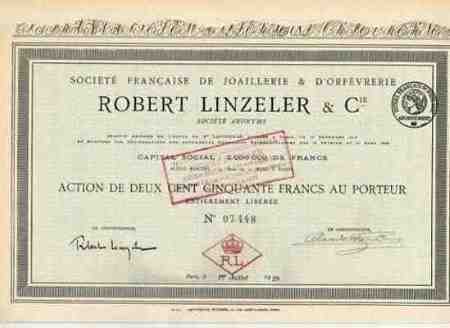 |
This month ASCAS presents a 250 Francs stock issued
by:
SOCIÉTÉ FRANÇAISE DE JOAILLERIE & D'ORFÈVRERIE
ROBERT LINZELER & Cie
The firm was active in Paris at 68 rue de Turbigo, 4
rue de la Paix and 9 rue d'Argenson.
Its mark was "RL under a royal crown" (April 14,
1897 - February 10, 1926)

|
"A WORD per MONTH"
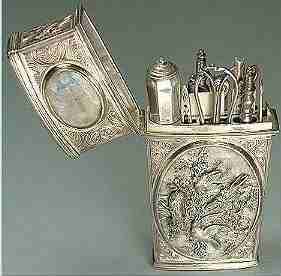
|
ETUI
Etui (a French word) is a small case made in
different materials such as wood, leather, ivory,
silver, gold, tortoise shell, mother of pearl or
shagreen.
They are variously shaped and decorated and mounted with
gilt hinges and collars......
more
|
"A SILVERSMITH per MONTH"
|
|
MATTHEW BOULTON
Boulton was not a "goldsmith"
or a "silversmith" in the accepted sense, yet for his
achievements and services to the craft of goldsmithing
he is fully worthy of inclusion in the list of great
English goldsmiths.
Matthew Boulton was born in Birmingham on 3 September
1728. His father Matthew Boulton (senior) was a "toy
maker" and silver stamper specialized in the production
of shoe-buckles.
Boulton junior was taken into partnership in 1749 and
was left in sole charge of the business after the death
of his father in 1759.
Boulton had the ambition to establish a manufacturing
complex where craftsmen in the various branches of the "toy"
trade would work together under one roof, enabling him
to reap both wholesale and retail profits. In 1761 he
realized his project purchasing a one-hundred-
year-lease of the "Soho" estate at Handswoth Heath (two
miles from Snow Hilton the Wolverhampton Road).
In 1762 Boulton took into unofficial partnership John
Fothergill who would act as a travelling salesman to
advertise his wares and the factory moved to Soho in the
same year......
more
|
"A CREST per MONTH"
Closing our JANUARY 2015 edition of ASCAS Newsletter I hope
you have appreciated its content.
Your comments, suggestions and advice will be of great help.
My thanks to Sheldon Blom, Charles C. Cage, Allen Carlson, Hans Demel, Chris &
Sue Driver, Rod Hall, Jeffrey Herman, Janjaap Luijt and Michael
B. Neville for their precious contributions.
Giorgio Busetto
Secretary
DISCLAIMER AND PRIVACY POLICY
ASCAS is a community of people having a common
interest in antique silver.
It is a non-profit association without commercial links.
Membership is open to whomever has a true interest in
this subject matter.
ASCAS has no real property and no fees are requested nor
accepted from members.
ASCAS keeps in touch with its members only through
periodical newsletters, e-mails and web-site updating
and ignores and is not responsible for any other
activity pursued by its members.
Likewise, ASCAS is not responsible for opinions,
evaluation and images displayed, and in any form
published or supplied for publication, by its members
who, in any case, maintain the property of their works
and assure the respect of national and international
legislation about Intellectual Property.
ASCAS does not have the full addresses of its members (only
town, country and e-mail address are requested for
membership).
ASCAS handles and protects with care its members' e-mail
addresses, will not disclose the addresses to third
parties, will use this information only to reply to
requests received from members and for communications
strictly related to its activity.
These rules are expressly accepted by submitting the
membership request.
|
|
 newsletter
# 128 January 2015
newsletter
# 128 January 2015









